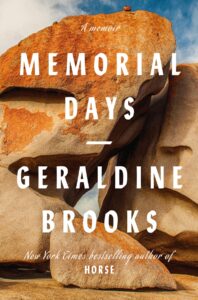In her new memoir, Memorial Days (Viking, 2025), Geraldine Brooks with matter-of-fact and elegant prose delves into a universal experience that, as a culture, we try our best to push aside: grief.

Brooks, who lives in Chilmark on Martha’s Vineyard, is the Pulitzer Prize-winning author of the historical novels Caleb’s Crossing, March, and Horse. In her memoir, she reflects on the aftermath of the sudden death of her husband, Tony Horwitz, and a trip she took three years later to Flinders Island in Australia to grieve and memorialize him.
The story flips back and forth between the Vineyard and Flinders Island, creating a contrast between the chaotic period after Horowitz’s death and Brooks’s retreat, during which she was able to carve out time and space for contemplation. Brooks will be in conversation with Patrick Nolan, vice president of Penguin Books, in a program titled “An Author’s Life and Work” in the Twenty Summers series at the Hawthorne Barn in Provincetown this Saturday, June 7. (As of press time, the program is sold out.)
Before she was a novelist, Brooks was a journalist. Describing her husband’s death, she writes with precision. We learn that on Memorial Day weekend in 2019, Horwitz, also a journalist, who had won his own Pulitzer for his work at the Wall Street Journal, died suddenly of cardiac arrest in Washington, D.C. while on a book tour.
He was 60, and his death came as a shock. But Brooks quickly composes herself. We follow her from Martha’s Vineyard to George Washington Medical Center in Washington, where her husband is pronounced dead. Coincidently, this was the place where he had been born. Back home, she confronts a long list of tasks — paperwork, taxes, memorial services, and canceling events.
In self-preservation, Brooks gathers her community of friends on the Vineyard long before the formal memorial: “If we didn’t see these kind friends jointly, we would have to deal with them severally. I would not be able to go to the supermarket without being run over by people expressing their sorrow in the vegetable aisle.”
Brooks was, at the time, writing her novel Horse. She struggles to return to it after her husband’s death but eventually manages to complete the book during the lockdown days of the pandemic. She was also caring for two teenage boys who had just lost their father. There was little space for her own emotions.
Brooks had visited Flinders Island with Horwitz in 2000 when she was doing research for a novel that never materialized. It made sense as a place to spend her “memorial days,” as she calls them: “I am taking something that our culture has stopped freely giving: the right to grieve. To shut out the world and its demands.” Thus, she leaves one island known as a place of retreat for another. But the place where one lives, works, and has friends and family is full of commitments, no matter its size or remoteness. It is these commitments, more than anything else, that Brooks escapes. She realizes she had hidden her sorrow behind an exhausting facade so she could meet life’s demands.
On Flinders Island, she lets go of this facade and allows her emotions and feelings to come to the fore. In recounting this time, her writing is looser, moving between memories of her husband, reflections about the nature of grief, and descriptions of the time she spends walking along the shoreline, reading Horwitz’s journals, cooking simple meals, and writing.
Brooks stays in a shack by the beach. She is alone except for the local wildlife and the random selection of her husband’s journals that she stuck in her luggage. She finally starts to process Horwitz’s death.
Nature becomes a source of solace. Her shack looks out to the open ocean, and no other dwellings are in sight. Brooks describes the beauty of the landscape — orange horizons and cobalt skies with beach fading into forest. She sees abundant native species: casuarinas, Tasmanian blue gums, wallabies, and pademelons — small hopping marsupials — that come up on her shack’s deck.
Her perception of time and sorrow widens as she meditates on an environment formed more than 12,000 years ago. The ancient rocks and the island’s human history raise questions: “When early death was ubiquitous, was the pain of loss any less, or did the precarity of life make each loss even more painful?”
Despite the premise of the memoir as a book about grief, Memorial Days has its moments of joy. Brooks describes her time spent with Horwitz as a war correspondent in the Middle East in the 1980s and ’90s. She writes of the hard slash of her husband’s pen as he edited out her favored words (“desiccated” and “gnarled”) from her manuscripts. She fondly remembers their life together on Martha’s Vineyard: writing books, raising their sons, and hosting laughter-filled dinner parties.

Horwitz, as Brooks describes him, could light up a room with his storytelling and exuberance. That same intensity caused him to push himself without rest. Brooks discloses that she intended to put her foot down after his book tour. She knew he needed to drink less and take better care of himself. In these reflections, the reader gets a sense of Brooks’s love for Horwitz as well as her feelings of anxiety and regret.
Her husband’s journals bring back forgotten memories and reveal a vulnerability in his mental state that Brooks had not intuited: deep insecurities about his career and feelings of failure, despite his Pulitzer Prize for national reporting. Brooks writes, “My sunny, funny lover is rarely found in these pages. I begin to see that he turned to his journals when he was not that guy — that guy didn’t need them.” And yet, she finds comfort, too, for Tony writes that “our marriage is still the one thing I feel is utterly mine, created out of clean cloth, no taint of all that makes me uncomfortable. My refuge.”
In addition to the contemplation that Flinders Island facilitates, Brooks finds solace in the process of remembering through writing. In her afterword, she writes, “I have written this because I needed to do it. Part of the treatment for ‘complicated grief’ is to relive the trauma of the death, returning to the moments again and again, striving each time to recall more detail. That’s what I have tried to do.”
At one point, Brooks imagines what her husband would have thought of her introspection: “I see him grinning, amused. ‘What do you think you’re doing, you mad woman? For god’s sake, go to the pub!’
“I smile back at him, but I shake my head. I’m allowing myself, at last, to wait a long time with my sorrow. To wait as long as it takes.”
In the book, Brooks’s time with her sorrow has no specified ending. Eventually, however, she must return to her regular life and routines. But her “self-administered therapy” helps her heal. Brooks writes, “At home now I make more time for the beauty. I make a point to notice the trees, in all their various seasonal personalities…. These encounters, more than almost anything else, have the power to elevate me out of sadness.”
Brooks encourages her readers to find their own way to do the same — to take time to notice life’s small joys and to tell their story in whatever way they can.
An Author’s Life and Work
The event: Geraldine Brooks and Patrick Nolan in conversation
The time: Saturday June 7, 6 p.m.
The place: Hawthorne Barn, 29 Miller Hill Road, Provincetown
The cost: $20 suggested donation at 20summers.org



